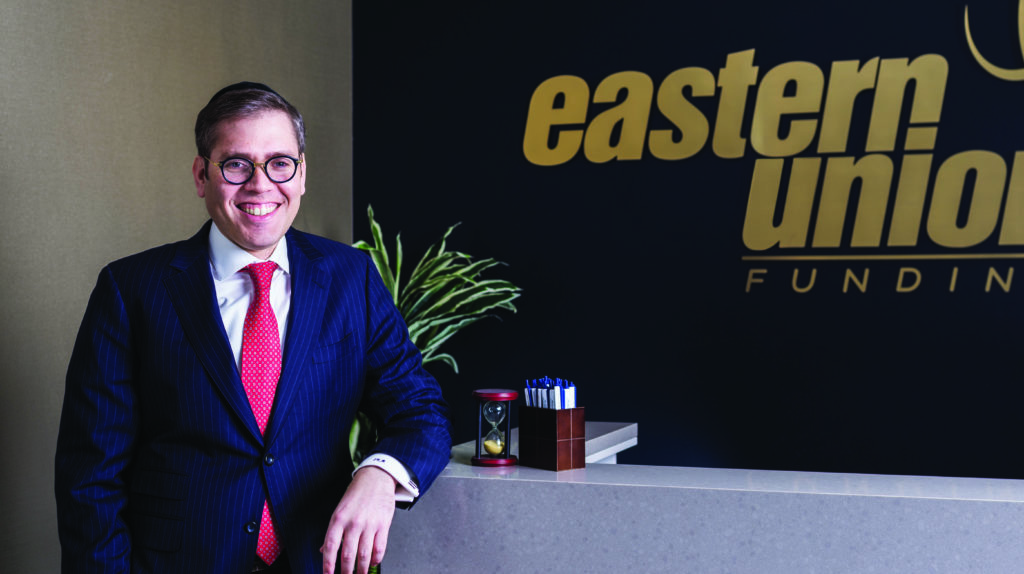Make It Whole

Ira Zlotowitz’s first career move as a kid involved a wheelbarrow and a garbage collection route in the bungalow colony. Today, as a financial wizard whose brokerage firm closed nearly $3 billion in deals last year, he integrates the lessons learned in a family of Torah and chesed into his life as a mortgage mogul.

Ira Zlotowitz gives out business cards in a rectangular plastic sleeve that holds a $2 bill. Why $2? “It makes people remember us,” he says. “We tell our clients, ‘The first $2 is free.’ ” The sleeve is embossed with the legend: “There’s Millions More Where This Came From.”
But at this stage, Ira Zlotowitz doesn’t need clever shticks to be memorable. Behind the modern, round spectacles is a financial wizard now at the head of Eastern Union, a commercial mortgage brokerage firm that closed nearly $3 billion in deals in 2014. This 39-year-old mogul has merited a New York Times interview, along with inclusion in Crain’s list of “40 under Forty,” and the newspaper’s “50 Fastest-Growing Businesses.”
Zlotowitz speaks with a combination of earnestness, focus, and wry humor. His words, tinged with a Brooklyn accent, tumble out quickly. “He often thinks of ideas even faster than he can speak them,” says Anna Rothstein, his executive assistant. Eager to impart his business insights, he is otherwise very unassuming, looking mildly surprised that anybody would be interested in his personal life.
The son of Rabbi Meir and Rachel Zlotowitz, Ira literally grew up alongside his father’s ArtScroll publishing company, founded six months after his birth. He was the sixth child of eight; the first ArtScroll Gemara was published when he was in ninth grade. In those early years, he says, “there was a lot of enthusiasm at the access people suddenly had to learning, which until then was largely off-limits to the average English-speaker, but at the same time, some people voiced some skepticism.” Fortunately for the Jewish community, the Zlotowitzes have never paid attention to the naysayers. “Our father started an empire,” states brother Gedalia Zlotowitz. “Other people may have thought of the same idea, but our father was the one to start it and follow through. Yisroel [Ira] has the same kind of drive — I never see him relax.”
Ira still looks to his father for the occasional eitzah, citing him as his role model. The Zlotowitz family has a mesorah of chinuch and chesed in addition to their business acumen. Ira’s great-grandfather, Yisroel Yehuda Zaltzman (for whom he is named) opened the first cheder in Montreal, and was known for the help he extended to survivors arriving after World War II. Ira’s parents were very close to Rav Moshe Feinstein ztz”l, and remain connected to Rav Dovid Feinstein shlita, speaking to one another on a nearly daily basis. Ira’s mother, Rachel Zlotowitz, was involved in early childhood education and teacher training for many years, promoting a child-centered approach to chinuch that aims to understand each child and how he functions best. “My mother always sees the good in everyone,” Ira remarks with visible admiration, and this direction has influenced his own approach to honing in on his employees’ strengths.
“Ira was an entrepreneur from very young,” remembers his mother. “He inherited that and his work ethic — and his orderliness — from his father.”
Ira himself recalls being the kid in the class who was always selling things to his classmates. “I remember one Rosh Chodesh in eighth grade when I got a kid’s dad to invest with us: He gave us $100 and we bought doughnuts for the whole school and sold them at a profit.” He grins. “My dad wasn’t amused.”
Mrs. Zlotowitz recalls that even as a kid, her son had an eye for turning a job into something more profitable. When asked in the summer to take the family’s garbage down the road to the bungalow colony’s dumpster, he figured he might as well take the neighbor’s garbage at the same time. Then he chanced upon a wheelbarrow he could use to ease the shlepping and add more garbage to his run. Soon he was turning a profit as the colony’s garbage pickup service.
Then there were the annual tzedakah carnivals he instigated. “Yisroel’s brother was in Camp Munk, where they had a carnival with real equipment,” Mrs. Zlotowitz says. “Well, Yisroel managed to get his brother to bring all the real carnival stuff to our little bungalow colony for his event — he’s very persuasive.”
Oops! We could not locate your form.













